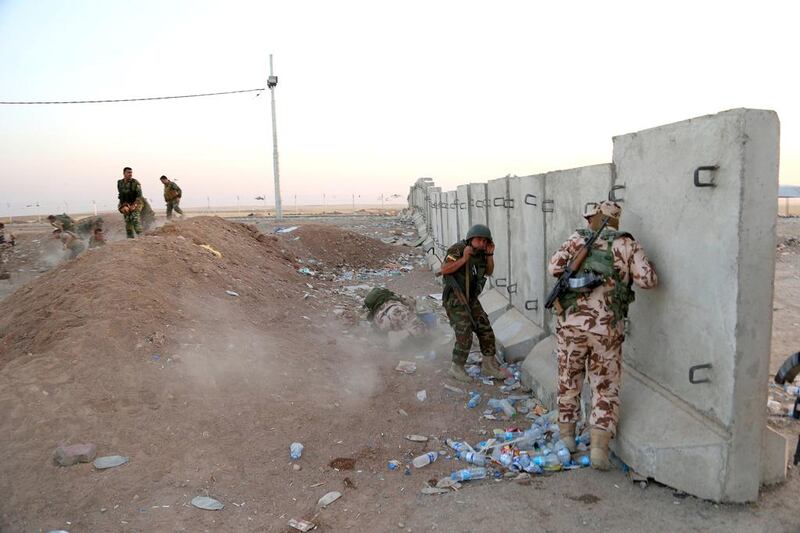ERBIL, Iraq // US jets struck Islamic State positions in northern Iraq on Friday, a potential turning point in a two-month crisis Washington said was threatening to result in genocide and to expose US assets.
The airstrikes, the first US military intervention in Iraq since the its withdrawal in 2011, were ordered by President Barack Obama in response to massive gains by the extremist militants.
In the past week the group has forced a mass exodus of religious minorities from towns that they captured and also seized Iraq’s largest dam.
The first US airstrikes were followed by a White House statement that they could be expanded support to Iraqi security forces in repelling Islamic State fighters once the country formed a new “inclusive” government.
Mr Obama’s initial authorisation of limited strikes was to protect American personnel in Iraq and to address the humanitarian emergency created by displaced minorities.
White House spokesman Josh Earnest said any US support would not be “prolonged” and would not involve sending US troops to Iraq.
The Pentagon spokesman said US jets bombed Islamic State militants on riday after artillery fire against Kurdish regional government forces defending their capital Erbil.
Two jets hit a mobile artillery piece, said spokesman Rear Admiral John Kirby. A Kurdish official said the strikes targeted the towns of Gwer and Makhmur, south-east of the autonomous Kurdish region.
The launch of US airstrikes prompted the Federal Aviation Authority to ban all US airlines and other commercial craft from flying over Iraq. Several other airlines, including Lufthansa, Austrian Airlines and Turkish Airlines, said they were suspending flights to Erbil, while British Airways said its planes would stop flying over Iraq.
The US operation began with air drops of food and water for thousands of people hiding from the Sunni extremist militants in a barren northern mountain range.
Many people who have been cowering in the Sinjar mountains for five days in searing heat and with no supplies are Yazidis, a minority that follows a 4,000-year-old faith.
Mr Obama accused Islamic State, which calls Yazidis “devil-worshippers”, of attempting “the systematic destruction of the entire people, which would constitute genocide”.
The United Nations said it was “urgently preparing a humanitarian corridor”.
Panic had begun to grip Erbil after Islamic State advanced into the Nineveh plains separating the Kurdish capital from Mosul, where the militants have set up base after overruning the city in June.
The Kurdish security forces, the peshmerga, short of ammunition and stretched thin along a huge front, have been forced to retreat in the face of Islamic State attacks.
Their withdrawal from Iraq’s Christian heartland on Wednesday and Thursday sparked a mass exodus and spurred western powers into action.
Mr Obama’s announcement late on Thursday came after an emergency UN Security Council meeting called by France, which also offered to support forces battling the Islamists and contribute to the relief effort.
Chaldean Patriarch Louis Sako said Iraq’s largest Christian town of Qaraqosh was emptied of its population on Thursday and estimated the number of Christians forced from their homes at 100,000.
The capture of Mosul dam was another setback for the peshmerga who had been defending it and gave Islamist militants a power of life and death over a huge swathe of land.
A Kurdish and a local official said militants took it over on Thursday and warned that any “unscientific manipulation” could have disastrous consequences.
A 2007 letter to the Iraqi government based on a US assessment had warned that “catastrophic failure of Mosul dam would result in flooding along the Tigris river all the way to Baghdad”.
While Islamic State has weaponised dams before, Mosul dam provides water and electricity to its main stronghold and is crucial to its own state-building efforts.
In Mosul, the country’s second city, identical sermons were delivered in all mosques on Friday, residents said, with worshippers asked to swear obedience to the “caliph”, Abu Bakr Al Baghdadi.
The leader of Islamic State proclaimed a “caliphate” straddling Syria and Iraq in late June, and the Sunni group’s gains have brought a country already rife with sectarian tension closer to collapse.
The United States, the Shiite religious leadership, powerful neighbour Iran and even much of his own party have all pulled their support to the divisive prime minister Nouri Al Maliki, he has so far refused to give his bid for a third term.
* Agence France-Presse with additional reporting by Reuters





